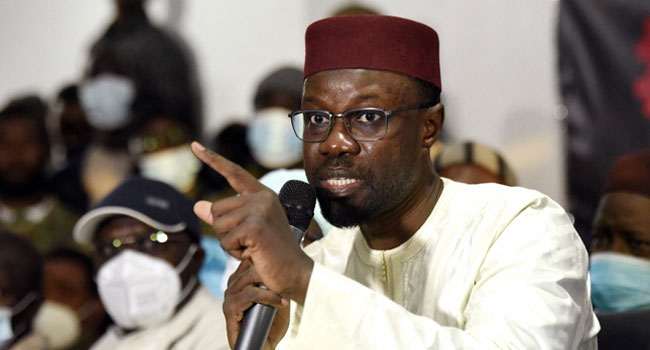In a pivotal development that has sent shockwaves through the political landscape of Senegal, the Supreme Court has upheld the libel conviction of Ousmane Sonko, a leading opposition figure. This decision potentially disqualifies him from participating in the upcoming presidential elections, marking a significant turn in the nation’s political narrative.
Sonko, who has been seen as a formidable challenger in the race to succeed President Macky Sall, faces an uncertain political path following the court’s verdict. His appeal against the libel conviction, which could bar him from the February presidential contest, has been dismissed, a move that shakes the foundations of Senegal’s political arena.
Embattled with legal challenges since 2021, Sonko has consistently denied all allegations against him. The latest development was revealed by his lawyer, Cire Cledor Ly, who expressed profound disappointment. Ly disclosed that the Constitutional Council found Sonko’s application for the presidency “incomplete,” without specifying which elements were missing. Decrying the situation as an “electoral farce,” Ly announced that Sonko, currently imprisoned on charges of insurrection, plans to appeal the decision.
In what was initially seen as a favorable turn for Sonko, a court had last month ordered his reinstatement on the electoral roll. This move was perceived as potentially clearing his path to enter the presidential race, despite a previous bar due to a different conviction. However, Sonko’s legal battles continued as he was acquitted of rape charges in June last year but convicted of “corrupting” a massage parlour employee in 2021.
Sonko has maintained that he is the target of a politically motivated campaign aimed at blocking his presidential bid. In contrast, the government has accused him of inciting violence, leading to the dissolution of his party last July.
Further complicating his legal woes, Sonko was sentenced to a six-month prison term in May last year for defaming Mame Mbaye Niang, the Minister of Tourism. The Supreme Court’s decision to reject Sonko’s appeal against this libel conviction came after a marathon 12-hour hearing.
Under Senegal’s electoral regulations, this conviction disqualifies Sonko from the presidential race set for 25 February. His repeated arrests over the past two years have sparked several bouts of deadly unrest, challenging the stability of one of West Africa’s most stable democracies.
The nation now anticipates the Constitutional Council’s announcement of the final list of presidential candidates, scheduled for release on 20 January. This decision is expected to have significant implications for Senegal’s democratic processes and its political future.
As the country gears up for its presidential elections, the unfolding situation around Ousmane Sonko underscores the intricate dynamics of law, politics, and social unrest in a region where democratic ideals often grapple with complex political realities.





